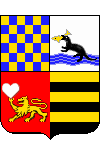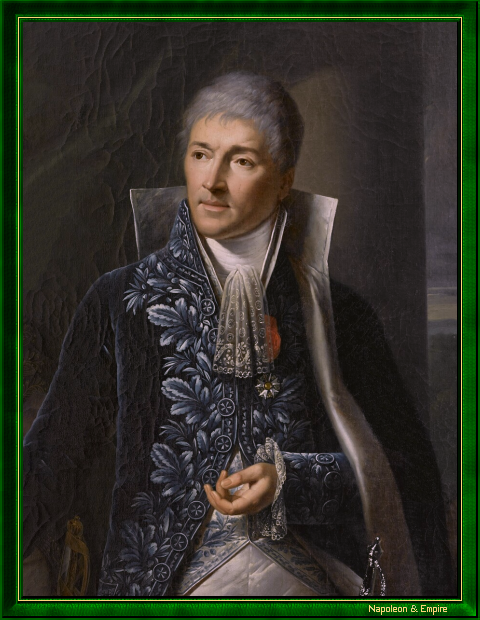Louis-Guillaume Otto
Count of Mosloy
Pronunciation:

Louis-Guillaume Otto was born into a Protestant family, either in Strasbourg in 1753 or in Kork, in the Duchy of Baden, on August 7, 1754, depending on the source.
He studied foreign languages and public law at the University of Strasbourg. In 1776 or 1777, on the recommendation of his teachers, he became private secretary to the Chevalier de La Luzerne, then French Minister Plenipotentiary to Bavaria, and followed him to the United States when he was appointed (September 1779).
In May 1785, following the departure for Saint-Domingue of François de Barbé-Marbois, the previous holder of the post, he succeeded him as legation secretary, then twice acted as chargé d'affaires for his chiefs before returning to France in December 1792. During these years, he befriended George Washington and leading members of Congress, married a Miss Livingston, a member of one of the most prominent families in the United States and, after her death, remarried the daughter of J. Hector Saint-John de Crèvecoeur, French consul in New York and a renowned writer.
Shortly after his return, in February 1793, the Comité de Salut Public appointed him head of the first political division of foreign relations, replacing Hugues-Bernard Maret (future Duke of Bassano), who had been sent on a mission to London. But the revolutionary day of May 31st, which marked the political defeat of the Girondins, led to his dismissal. Arrested and interned in the Palais du Luxembourg, which the Convention had turned into a prison, he almost shared their fateful fate.
Sources differ on the period from 9 Thermidor An III to May 1798. Did he return to his post? Did he immediately retire to Lesches (Seine-et-Marne)? What seems certain is that he no longer held an official position when Emmanuel Siéyès, leaving for his embassy in Berlin, appointed him as legation secretary.
A year later, when Sieyès, elected Director, returned to Paris, Otto remained in Berlin as chargé d'affaires.
At the beginning of 1800, his perfect knowledge of the English language and customs sent him to London, first as commissioner for the exchange of prisoners of war, then as minister plenipotentiary responsible for initiating peace negotiations with the British cabinet. On October 1, 1801, his mission was accomplished. After overcoming many difficulties, he signed the preliminaries of the peace agreement, bringing great joy to the people of Paris and London alike.
He remained in office after the final signing of the Treaty of Amiens, but left London at the end of 1802, perhaps because he had displeased his supervising minister, Charles-Maurice de Talleyrand-Périgord, by refusing to lend a hand to his speculative operations. He was then offered the position of Minister Plenipotentiary to the United States, which he had to refuse on account of his wife's health, and found himself in Munich (1803), at the court of the Elector of Bavaria, a second-rate assignment at the time.
But his actions gave him a reputation. In 1805, he succeeded in persuading the Elector not to join the coalition formed by England, Austria and Russia against France, and then saved him from capture by the Austrian army once it had invaded the country. Napoleon showed his appreciation by appointing him State Councillor and Grand Officer of the Legion of Honor.
Otto remained in Munich until 1809, when he was appointed to Vienna - immediately after the Austrian campaign according to some sources (January 1810 according to the website of the French Embassy in Austria), in 1811 according to others. In any case, he seems to have played a role in the conclusion of the marriage between Napoleon and Marie-Louise, and became Comte de Mosloy in 1810.
Recalled in March 1813, he became Minister of State. Early the following year, the government decided to send him to Mainz to consolidate the city's loyalty, but he was unable to reach it.
Although he had rallied to the monarchy, the First Restoration, perhaps under the influence of Talleyrand, whose enmity had pursued him since 1801, sidelined Otto by making him an honorary State Councillor.
Very sensitive to this affront, he accepted the position of Under-Secretary of State for Foreign Relations during the Hundred Days. After the battle of Waterloo, the provisional government entrusted him with a mission to the English government, concerning Napoleon's personal safety. But he was unable to obtain his passports, and never made it beyond Calais.
He subsequently ceased all public activity and died in Paris on November 9, 1817.
His tomb is in the Père Lachaise cemetery in Paris, division 37 .
"Count Otto de Mosloy (detail") by Johann Baptiste Seele (Meßkirch, Württemberg 1774 - Stuttgart 1814).
